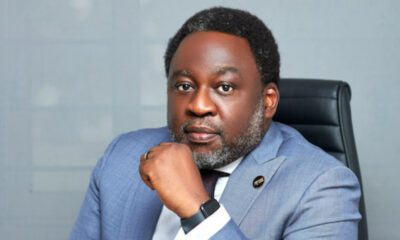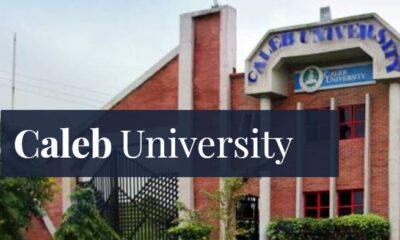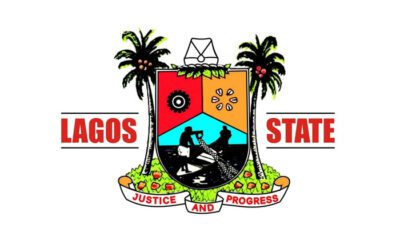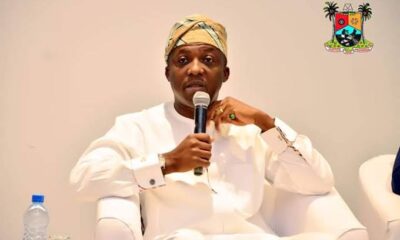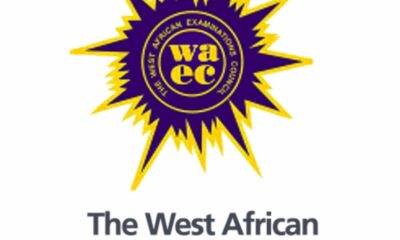News
Why we are partnering stakeholders to boost citizens’ capacity devt — LASG

The Lagos State Government (LASG) has said it is mustering partnership efforts with relevant stakeholders to further build a robust human capital resource to meet the demands of Lagos as a commercial hub of Nigeria and a leading business city in Africa and the world.
This is just as the State Government through its Office of Sustainable Development Goals in collaboration with the African Human Capital Development Plus has convened an Advocacy Workshop programme on Human Capital Development for stakeholders in Lagos State.
The programme was set aside as a strategic means to boost capacity development among residents of the State for a stronger base of human capital resource
Speaking at the event held in Ikeja, the State Capital, the Head of Service, Lagos State, Mr. Bode Agoro explained that a key emerging priority of the Governor Babajide Sanwo-Olu led administration in recent times is the alignment of policies and initiatives to inspire collective effort in solving emerging problems, as the government is working across different sectors to advance good governance.
Agoro who described the 2-Day Workshop as very critical towards strengthening the State’s HCD policies and fostering greater engagement with citizens, revealed the State’s efforts towards connecting diverse stakeholders, including development advocates and policymakers will advance the Agenda of human capital development.
“Lagos is one of the most suitable places in Africa where human capital development can be explored in its entirety. As a home to one of the most dynamic and multicultural populace in the world with a value-based commercial and enterprising economy, the city represents an ideal setting for policymakers to examine the challenges and opportunities associated with human capital development on the continent,” he acknowledged.
Highlighting government interventions in the three thematic areas which are Education; Health & Nutrition; and, Labour Force Participation, in relation to the administration’s THEMES Plus Agenda, Agoro confirmed that the administration’s investment in the education sector remains paramount as all indices have shown some positive attributes that are catalyzing growth and development in the sector.
“The scale of Government investments in the health sector is designed to create new frontiers for health emergencies and promote greater inclusion by broadening access to healthcare, especially among under-served populations,” he said.
He affirmed that towards driving the labour force agenda, the government has continued to pursue an enterprising society through a symbiotic public-private strategy “by creating an ambience for our high workforce population to excel in all human endeavors.”
Earlier in her opening remarks, the Chief Executive Officer, Africa HCD Plus, Mrs. Finda Koroma explained that the HCD+ is working with a wide range of stakeholders to accelerate political commitments, decision-making and funding for key priorities towards realising Sustainable Development Goals in Sub-Saharan Africa.
Karoma who was represented by the Chief Operating Officer, Africa HCD+, Mr. Sheka Bangura noted that the path towards changing systemic issues, altering investment patterns, implementing comprehensive reforms, and shifting behaviours to further the HCD agenda demands active participation and ownership at every level of governance.
According to her, the Workshop aimed to develop actionable strategies for effective collaboration and craft robust advocacy implementation and evaluation plans to enhance the human capital resource of Lagos State and the nation at large.
While applauding Governor Babajide Sanwo-Olu for leading national efforts and harnessing the potential of diverse sectors for collaborative synergies, the Chief Executive Officer noted that stakeholders must unite with a shared vision and strengthen the pathway for its attainment.
“In line with the HCD+ thematic areas and within the broader context of the THEMES+ Agenda, Lagos State is already allocating a significant portion of its budget to education, health welfare and employment. It is admirable that the State is not driving these reforms in isolation but has formed effective partnerships with private sector actors,” she said.
In her remarks, the Permanent Secretary, Office of Sustainable Development Goals, Mrs. Tolani Oshodi stressed the importance of leveraging the untapped potential of the greatest asset – the people for the pursuit of the HCD Agenda.
She encouraged participants to explore opportunities in developing relevant advocacy and enlightenment strategies that will help the government articulate policies and plans that will impact the public positively.
The event had in attendance the Chairman House Committee on Sustainable Development Goals, Hon. Gbolahan Ogunleye, Body of Permanent Secretaries; Oba of Onigbongbo, HRH Oba Segun Ajasa; Oba of Oregun, HRH, Oba Olukunmi Olusesan; Chairperson, Lagos Island Connect, Ms. Yemisi Ransome-Kuti and participants selected across MDAs, NGOs, CSOs and Private Institutions
News
Tinubu to return Wednesday – presidency


The presidency has announced that President Bola Tinubu and his aides will return to Nigeria from Europe on Wednesday.
The special adviser on information and strategy to the president, Bayo Onanuga, announced in a post on his X handle on Tuesday.
“President Bola Ahmed Tinubu, along with his aides, will return to Nigeria tomorrow from Europe,” Onanuga wrote.
On April 22, Tinubu left Abuja, the country’s capital, for the Netherlands on an official visit.
The presidential spokesperson, Ajuri Ngelale, stated that the president was visiting The Netherlands at the invitation of Prime Minister Mark Rutte.
After the engagements in the country, Tinubu travelled to Riyadh, Saudi Arabia, between April 28 and 29 to attend a special World Economic Forum meeting.
Details later…
Crime
Engineering education springboard to Nigeria’s economic growth – VP Shettima
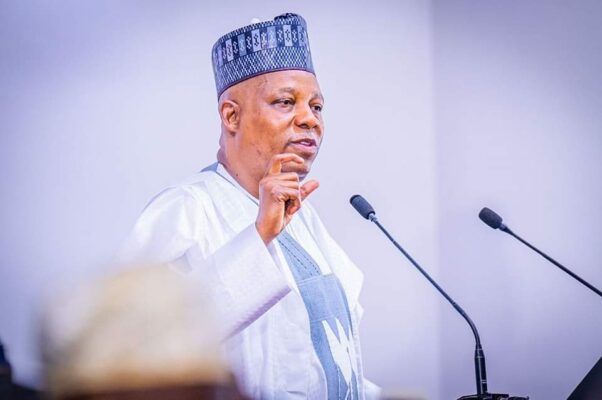

The Vice President, Kasim Shettima, says the quality of engineering education would help promote indigenous technology.
He spoke on Tuesday at a forum organised by the Nigerian Academy of Engineering in Abuja.
According to him, with the increasing urbanisation in Nigeria, 70 per cent of the Nigerian population will be in cities by 2050.
The VP, represented by his adviser on power infrastructure, Dr Sadiq Wanka, stressed that Nigeria could use its growing population to tap into the opportunities in the $360 million global outsourcing market.
“We also find ourselves facing rapid urbanization in the country, as estimates suggest that by 2050, 70 per cent of the Nigerian population will be living in cities. Given the nature and scale of the challenges ahead, the strength of our engineering capacity is inextricably linked to our economic and social progress.
“Nigeria is blessed with a young population. Our population is growing at over 3% per annum at a time when, in many developed nations, populations and workforces are ageing. Therefore, we can train our young citizens and position them to take up jobs in Nigeria and globally. And we are.
“Earlier this year, in line with Mr. President’s commitment to job creation, I launched the Outsource to Nigeria Initiative, which seeks to position Nigeria as a global outsourcing hub and tap into a $360 billion global outsourcing market,” he said.
In his speech, the President of the Nigerian Academy of Engineering, Prof Peter Onwualu, noted that if Nigeria prioritizes and uses Engineering and Technology to drive development in all sectors, the country will, in short, join the League of Developed Nations.
“With Engineering and Technology, we would our problems in food and agriculture, health care, communications, transportation, energy, power, commence, industry and indeed all sectors.
“If Nigeria can harness its technology efficiently, this will lead to a drastic drop in importation and promotion of made-in-Nigeria goods”, he told newsmen.
News
Cement price: Reps issue Dangote, BUA, others 14 days ultimatum to appear
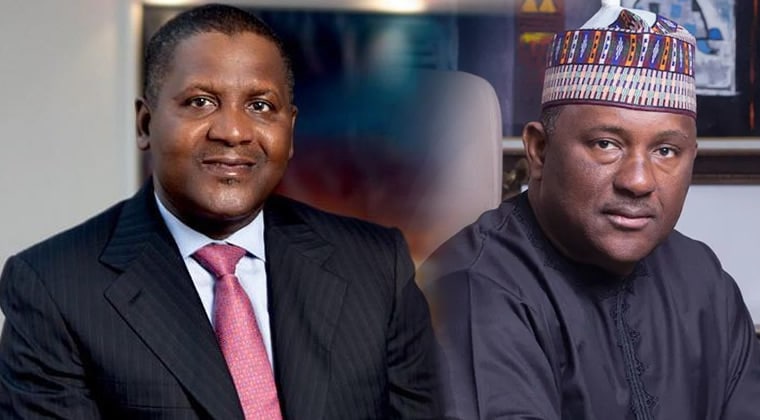

The House of Representatives has issued a 14-day ultimatum to Dangote Cement, BUA, Lafarge Ashaka and other cement manufacturing companies in Nigeria to appear before it to make their submissions over the arbitrary increases in the price of the commodity nationwide.
The Chairman, House Committee on Solid Minerals, Mr Gaza Gbefwi, gave the directive at a public hearing to investigate the arbitrary increase in the price of cement in Nigeria by cement manufacturers, organised by House Joint Committees on Commerce, Industry, Special Duties and Solid Minerals on Tuesday in Abuja.
The PUNCH reported on March 13, 2024, that the House adopted a motion on the “Arbitrary increase in the price of cement by the cement manufacturers in Nigeria”, and constituted a joint committee to investigate and report back to it for further legislative action.
At the public hearing on Tuesday, none of the cement companies appeared or sent representatives to make submissions on their behalf.
Angered by the development, Gbefwi who represents Karu/Keffi/Kokona Federal Constituency, Nasarawa State, said the parliament was not in receipt of a court order restraining it from inviting anybody or companies for investigative purposes.
He said: “We are trying to see to the development of our country. Just as it was emphasized in the opening remarks, cement is to building what air is to every human being. In the human nature of the House, because we owe them a duty of care because they are equally Nigerians, we are giving them 14 days to make their submissions.
If not, as we have sworn to uphold the constitution, we will use everything within our powers to make sure that Nigerians are not taken for granted and are not exploited. We will not sit back while some companies declare billions in naira and dollars every day while our people can barely afford to get a decent roof over their heads.”
“We have seen in Lagos where you have Nigerians under the bridge and paying rent. Why? If this product was available, I do not believe we would go to that length. Moreover, God has given to this nation, resources in abundance. So, this joint committee resolves to give them 14 days from now, and not 14 working days but 14 days to make sure that they make their submissions and appear before this House,” he said.
Earlier in his remarks, the Speaker, Abbas Tajudeen, represented by the Deputy Speaker, Benjamin Kalu, pledged the readiness of the House to come up with appropriate legislation to encourage the industrialisation of the country.
He also assured the companies invited for deliberations not to see their invitation as a witch-hunting mission, adding that the parliament was only interested in assisting in resolving the challenges in the building sector occasioned by frequent hikes in the price of cement.
He said: “We are committed to collaborating with both cement manufacturers and end-users, believing this is the most effective way to improve the quality of life and standard of living for our citizens. We are also dedicated to enacting laws that prevent a recurrence of the factors that led to the current situation.
“Our goal is to inform Nigerians about the industry’s current state and collaboratively find solutions to navigate the challenges. The persistent rise in cement prices has had a detrimental impact not only on the building environment but also on the entire economy. Cement is a fundamental component used in construction projects like bridges, dams, houses, waterworks, and road infrastructure. This makes addressing this issue paramount.”
Quoting research by the African Development Bank, Kalu said there is a housing deficit of up to 16.9 million units, adding that Lagos, Ibadan, Kano, and Abuja, have a 20 per cent rise in housing needs yearly. The current total output in the formal housing sector is estimated at not more than 100,000 units”.
The Deputy Speaker asserted that bridging this gap requires affordable and accessible cement prices for both the government and the private sector.
“While factors like exchange rates have contributed to the price increases across various commodities, it is encouraging to see the positive results of the “Renewed Hope” administration’s policies under the leadership of Bola Tinubu. Notably, the naira has shown remarkable strength against the dollar in recent weeks, and Fitch Ratings, a global credit rating agency, recently revised Nigeria’s credit outlook to positive from stable”, he added.
Earlier in his welcome address, Gbefwi said that Nigeria has a high housing deficit of about 3 million units and a huge infrastructural deficit.
He stated: “Indeed the recent events that led to the skyrocketing of the price of cement in Nigeria has been worrisome and of great concern as it is inflicting untold hardship on Nigerians.
“To close this gap, both government and the private sector must be articulate and deliberate in putting the right policies and parameters in place that can promote, induce and or encourage development.
He added that the cost of cement is higher in Nigeria compared to other countries in Africa using the current exchange rate of the dollar to local currencies.
“Our review of cement prices in other countries like Kenya, India and Zambia for 2021 alone shows that Nigeria has the highest price of cement using the official exchange rates for each country. Nigeria’s price of cement doubles that of India at a difference of 69 per cent. Similarly, the price is 29 per cent higher than that in Kenya and 39 per cent higher in Zambia; hence the need for us to come together and find out why,” he added.
-
capital market2 years ago
Rt.briscoe, FBNH, Others halts negative performance of stock market
-
Finance3 months ago
Court orders Sen. Victor Umeh to repay N136m bank debt to AMCON
-



 Abuja Update2 months ago
Abuja Update2 months agoUNDP, FG partnership needed to achieve inclusion, equity- Minister
-
Abuja Update1 month ago
Banks drive stock market performance with N147bn gain
-



 Business2 weeks ago
Business2 weeks agoTingo Group unveils Tingo Electric, Tingo Cola drink at Lagos launch
-



 Health3 weeks ago
Health3 weeks agoCapacity training will reduce migration of health workers- NPHCDA
-
News4 months ago
Oil thieves sponsoring malicious media campaign against Navy – Spokesman
-



 Infotech1 month ago
Infotech1 month agoWorld Backup Day: NITDA urges Nigerians to ensure backup of data

